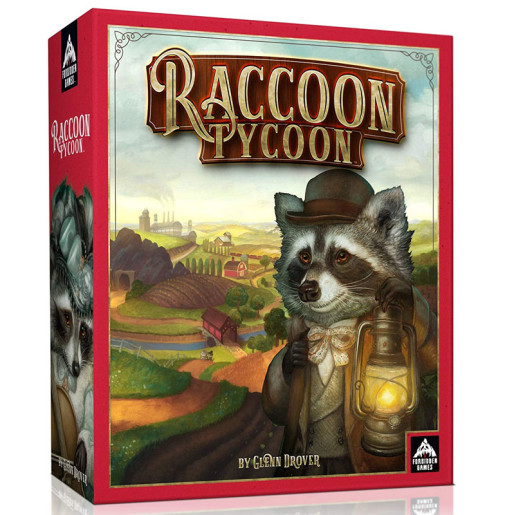We use cookies to make your experience better. To comply with the new e-Privacy directive, we need to ask for your consent to set the cookies. Learn more.
Raccoon Tycoon Game
- Small parts. Not for children under 3 years.
Welcome to Astoria where players join business tycoons as they make their fortunes helping the animals of their town feed their citizens, manufacture goods, earn luxuries and build their town’s businesses! Players will experience commodity trading, auctions, card set collecting and engine-building game mechanics as new towns, factories, and railroads spring up. Compete to build the biggest fortune to win Raccoon Tycoon! There are several commodities that are at the core of this game that vary in value and fluctuate with supply and demand. Sell these commodities for cash which is then reinvested in buildings, railroad auctions and additional resources. The game ends when either all buildings or railroads have been purchased. Players earn victory points for all railroads and towns that they own and the player with the most points wins the game. For 2 to 5 players, with a 60 to 90-minute playtime.
Astoria is a land bustling with productivity and growth! New towns, factories, and railroads are springing up across the land. A few savvy business tycoons (you and your opponents) are determined to make their fortunes on the crest of this wave. These Tycoons start out as the producers of the key commodities: wheat to feed the growing towns and factories, wood and iron to build them, coal to fuel the trains and factories, and manufactured goods and luxuries to fill the insatiable demand of the animals of Astoria. Cornering the market for the most valuable commodities can create small fortunes that can be invested in the new businesses, turning them into huge fortunes. The sky is the limit during this Gilded Age!
In Racoon Tycoon, players try to produce the most valuable commodities in an ever changing marketplace. They then use those commodities to build towns, or sell them at the best price to secure great profits that can be used to win auctions for the all-important railroads. The profits may also be used to buy powerful buildings that give the players power-ups or bonuses in production. Owning the best towns and railroads determines victory.
There can be only one ‘top dog’ in Astoria. Is it you?

